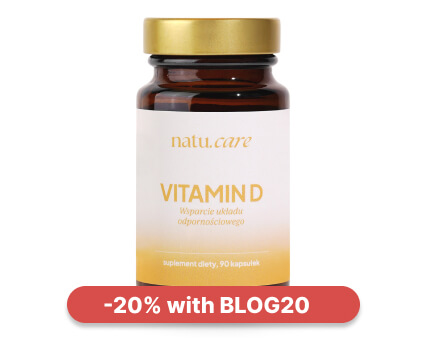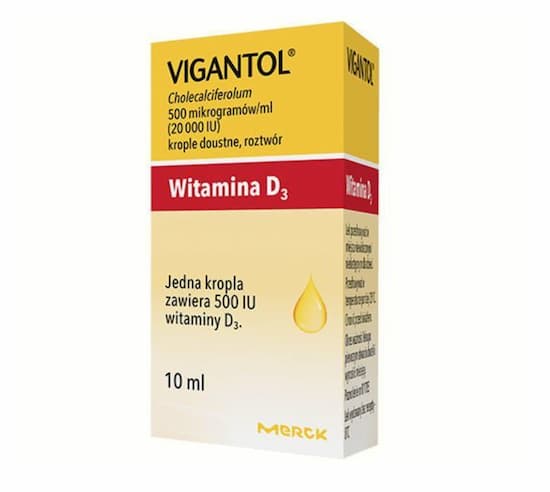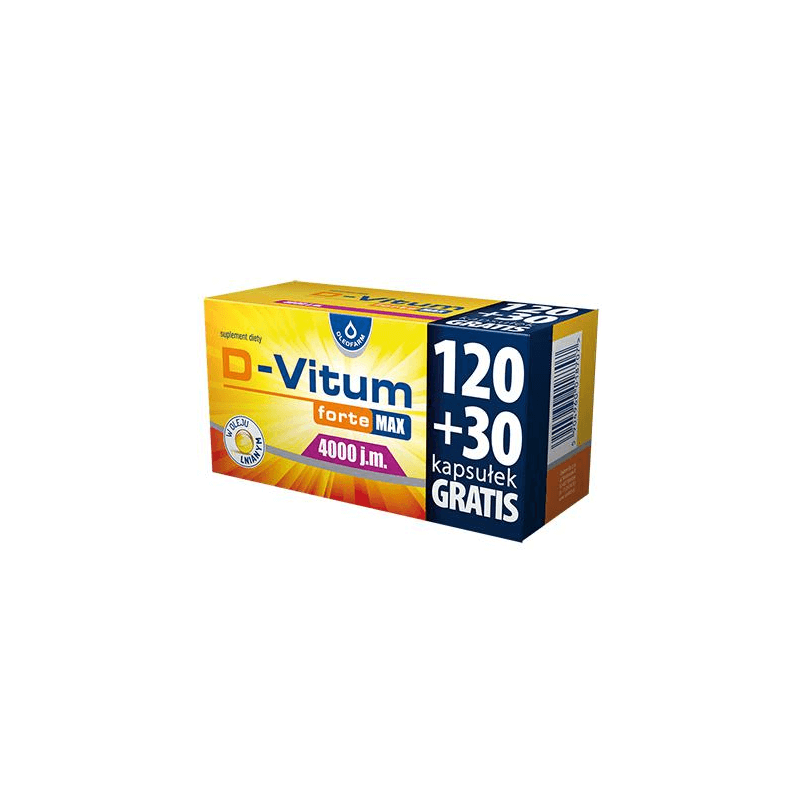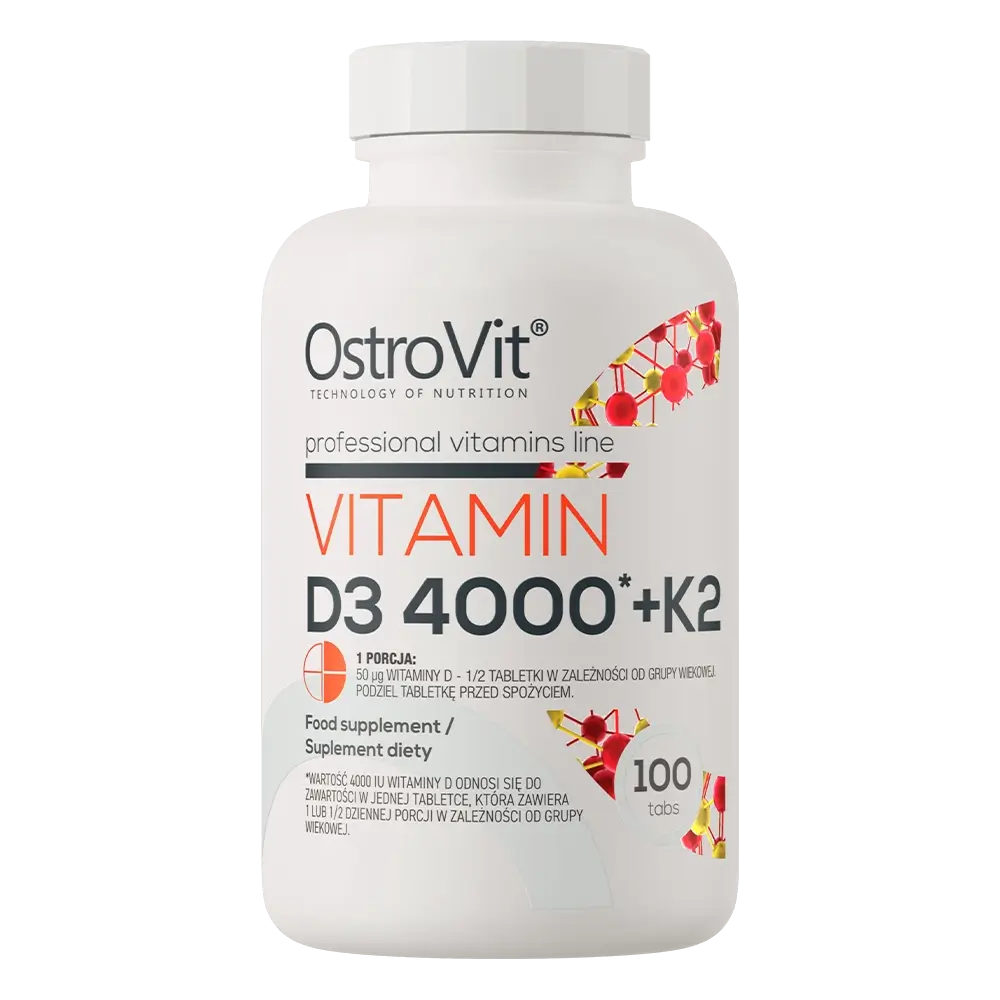Vitamin D - Dosage. Current standards and recommendations 2025
Adequate vitamin D3 supplementation is key to strengthening the body and correcting a deficiency.


Learn more about our editorial process
.

Learn more about our editorial process
.

Learn more about our editorial process
.

Learn more about our editorial process
.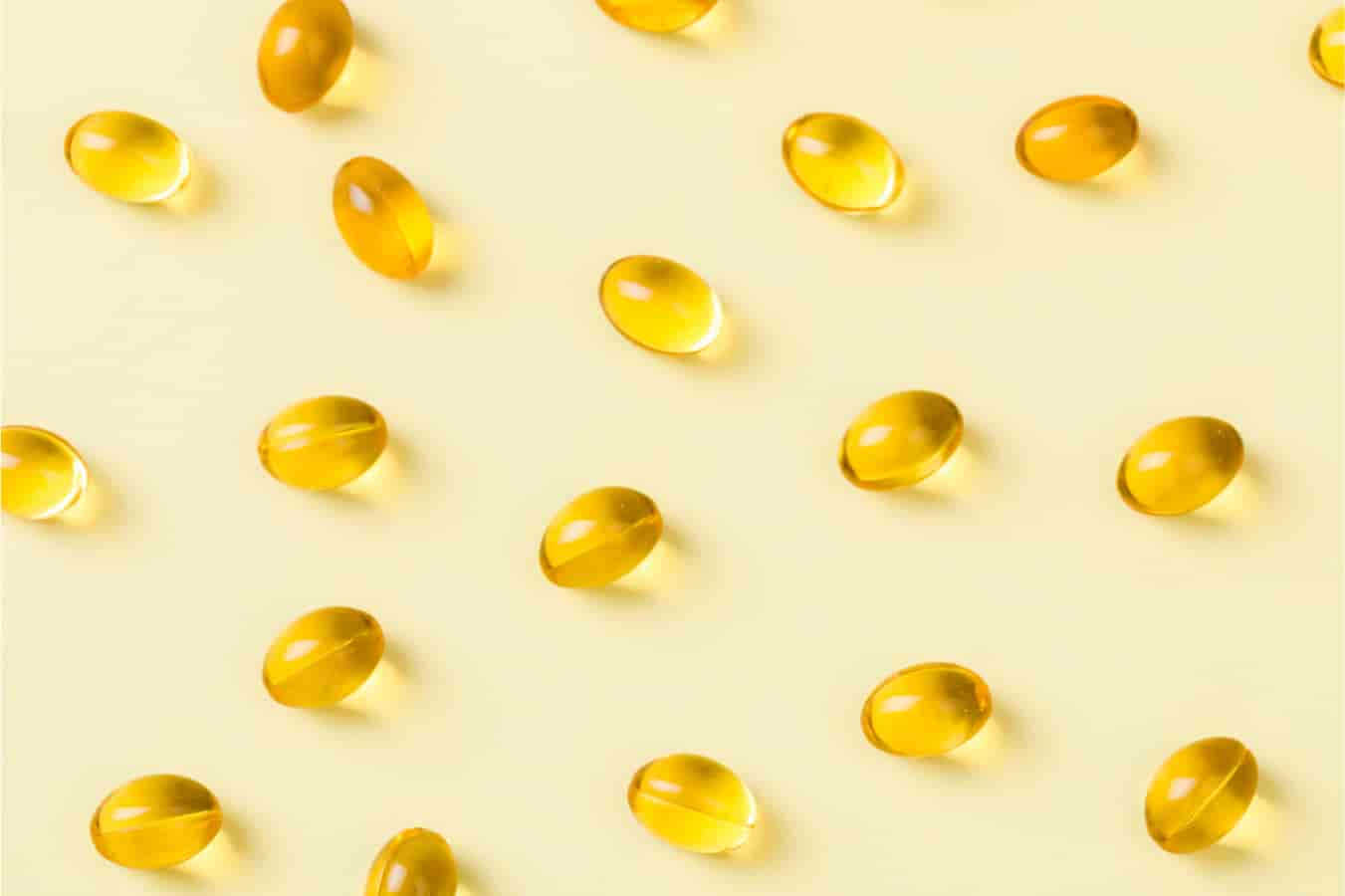
Why you can trust us
Articles on Natu.Care are written based on scientific research, data from government websites and other reliable sources. The texts are written in cooperation with doctors, nutritionists and other health and beauty experts. Articles are reviewed before publication and during significant updates.
.Learn more about our editorial process
.Information about advertisements
Content on Natu.Care may contain links to products from the sale of which we may receive a commission. When creating content, we adhere to high editorial standards and take care to be objective about the products discussed. The presence of affiliate links is not dictated by our partners, and we select the products we review ourselves completely independently.
.Learn more about our terms and Conditions
.Vitamin D deficiency in Poland is common. Do you want to take care of a healthy and safe supplementation? Together with nutritionist Marta Kaczorek, I have prepared for you the current recommendations for vitamin D intake.
Expectations: Get your vitamin D from the sun! Reality: You work in an office, and just when you feel like sunbathing, cloud cover appears. In winter, the days are short, and you can't manage to scramble a few dozen egg yolks for breakfast to cover your daily requirement. Fortunately, we have the option of supplementing with this vitamin!
Description of contents:
- Vitamin D - current standards and recommendations 2023 .
- Safe dosage of vitamin D. What does the expert say?
- Summary
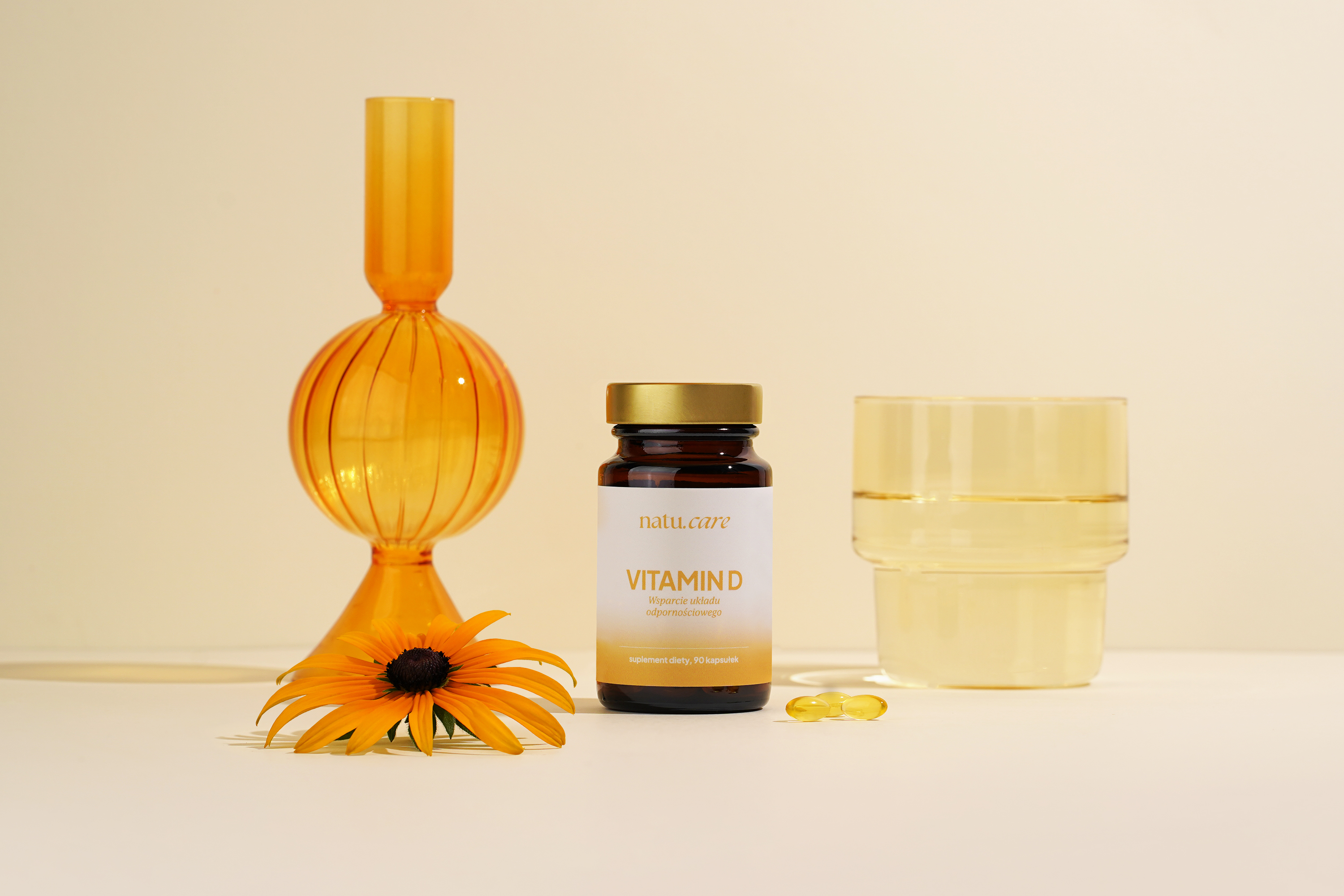
Zobacz, co dla Twojego zdrowia może zrobić Natu.Care Witamina D 2000 IU. -15% z kodem BLOG15
Natu.Care Witamina D 2000 IU
Natu.Care Witamina D 2000 IU wspiera prawidłowe działanie układu odpornościowego, utrzymanie zdrowych kości i zębów oraz utrzymanie prawidłowych funkcji serca, nerek i układu mięśniowego.
Sprawdź cenę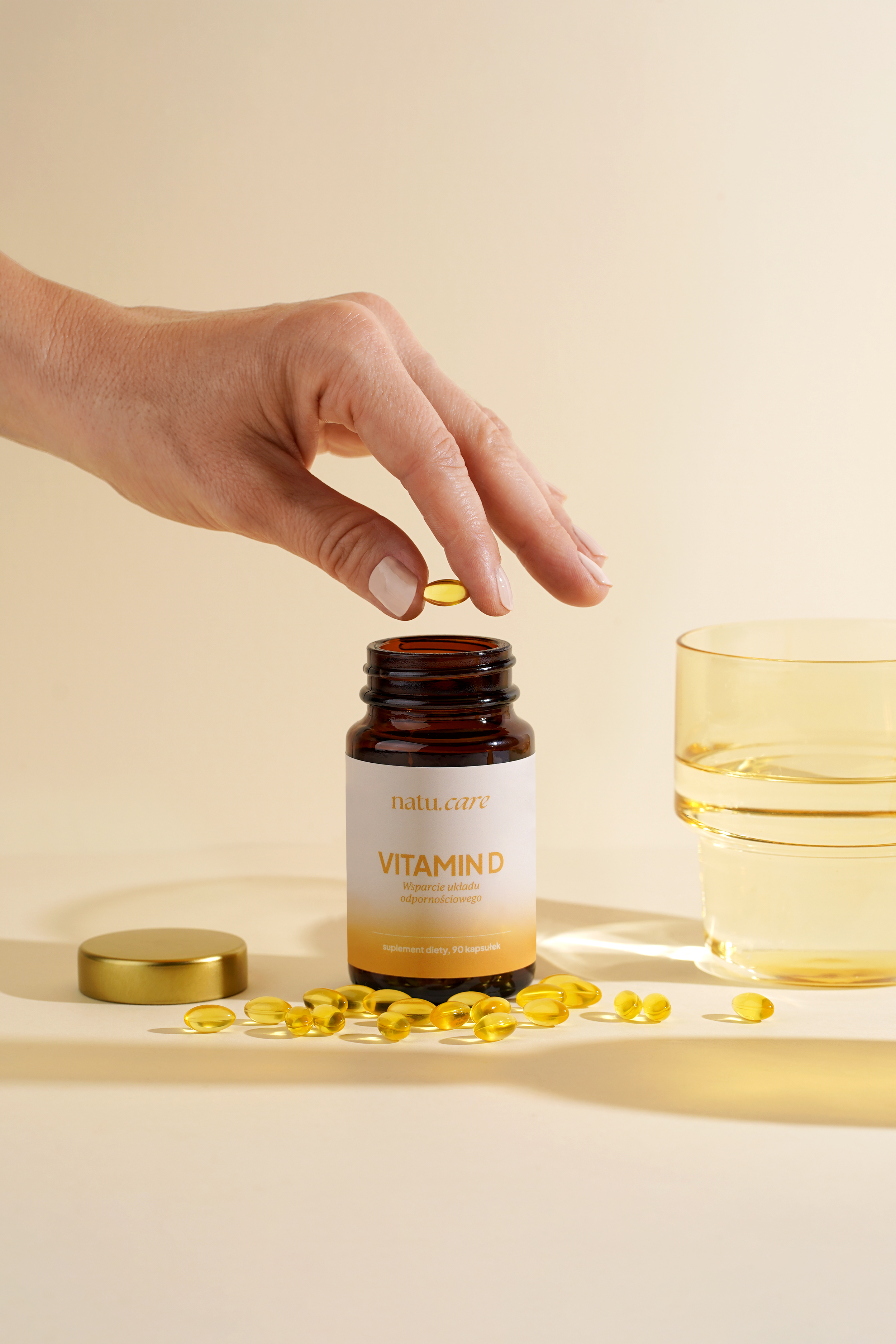
Świetny produkt, tabletki są małe i wygodne do połknięcia. Plus za wysoką jakość!Joanna
Natu.Care Vitamin D 2000 UI
Product description
Vitamin D plays a crucial role in our health and well-being. It affects calcium and phosphate metabolism, which translates to healthy bones and teeth. It also helps regulate the immune system, and studies indicate its influence on the functioning of the nervous system.
Vitamin D, although called a “vitamin,” is actually a prohormone that our body produces on its own, primarily under the influence of sunlight. Unfortunately, our modern lifestyle contributes to deficiencies of this essential vitamin. Working in enclosed office buildings, using (necessary!) SPF creams, and covering the body with clothing all make it very difficult, if not impossible, to obtain adequate levels of vitamin D from sunlight. This is why appropriate, year-round supplementation is so crucial.
Vitamin D from Natu.Care is a well-tested vitamin D3 suspended in safflower oil, a plant known for its numerous health benefits. The convenient, easy-to-swallow capsule will make supplementation a part of your daily, healthy routine, improving your overall well-being.
Pros and cons
Pros:
- Ensures proper functioning of the immune system
- Supports the maintenance of healthy bones and teeth
- Maintains proper heart, kidney, and muscle function
- Tested by an independent, certified laboratory
- Convenient and easy-to-swallow capsule
- Clean composition - free from added sugar, gluten, GMOs, lactose, and without preservatives or colorants
Cons:
- None.
Additional Information
Pregnant women and breastfeeding mothers should consult a doctor before using the product. This dietary supplement is intended for a healthy adult population up to the age of 75.
OstroVit Vitamin D 4000 IU
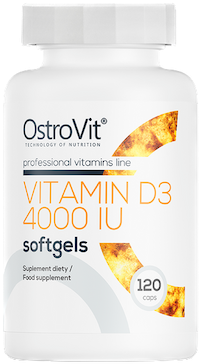
- Content vitamin D3: 4000 IU
- Form: capsules .
- Dose: 1 capsule per day .
- Sufficient for: 120 days .
Product description
OstroVit Vitamin D 4000 IU is a dietary supplement in the form of soft capsules, specially designed for peopleóing vitamin D deficiency, and especially recommended for seniorsów.
.Contains 4,000 IU of vitamin D per capsule, enabling effective dietary supplementation. The olive oil contained in the formula enhances the absorption of vitamin D, further enriching the supplement with healthy fats.
The supplement contains a wide range of vitamins and minerals.
The pack contains 120 capsules, allowing for four months of supplementation when taken with one capsule per day.
Pros and cons
OstroVit Vitamin D 4000 IU is a dietary supplement in the form of soft capsules, specially designed for peopleóing vitamin D deficiency, and especially recommended for seniorsów.
.Contains 4,000 IU of vitamin D per capsule, enabling effective dietary supplementation. The olive oil contained in the formula enhances the absorption of vitamin D, further enriching the supplement with healthy fats.
The supplement contains a wide range of vitamins and minerals.
The pack contains 120 capsules, allowing for four months of supplementation when taken with one capsule per day.
Additional information
OstroVit Vitamin D 4000 IU is a dietary supplement in the form of soft capsules, specially designed for peopleóing vitamin D deficiency, and especially recommended for seniorsów.
.Contains 4,000 IU of vitamin D per capsule, enabling effective dietary supplementation. The olive oil contained in the formula enhances the absorption of vitamin D, further enriching the supplement with healthy fats.
The supplement contains a wide range of vitamins and minerals.
The pack contains 120 capsules, allowing for four months of supplementation when taken with one capsule per day.
Dr. Jacob's Vitamin D3 drops
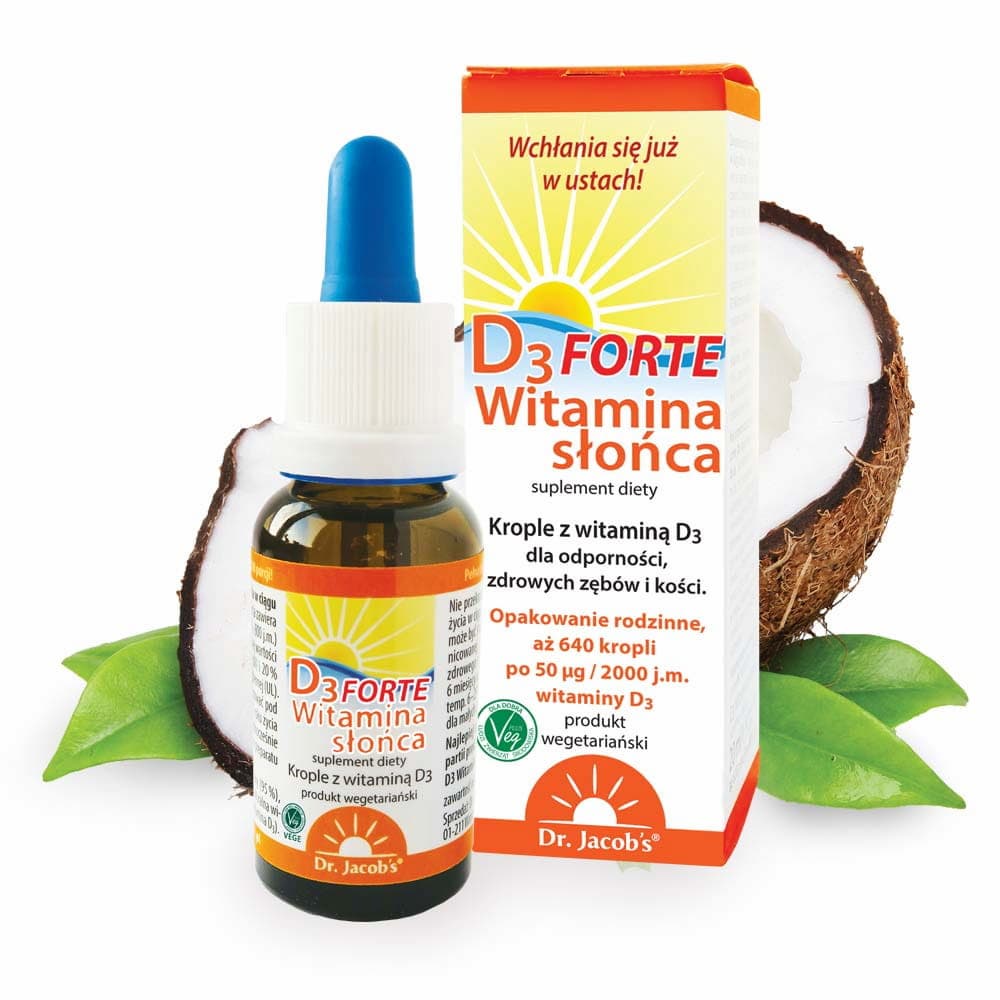
- Content vitamin D3: 800/1600 IU
- Form: drops .
- Dose: 1 or 2 drops daily .
- Sufficient for: 320–640 drops .
Product description
Sunshine Vitamin D3 FORTE is a dietary supplement containing a high dose of vitamin D3. Each drop of the product provides 800 IU of this essential vitamin for the proper functioning of the organism, whichóra supports the proper absorption of calcium and the maintenance of healthy bones, teethóra and muscles.
Pros and cons
Sunshine Vitamin D3 FORTE is a dietary supplement containing a high dose of vitamin D3. Each drop of the product provides 800 IU of this essential vitamin for the proper functioning of the organism, whichóra supports the proper absorption of calcium and the maintenance of healthy bones, teethóra and muscles.
Additional information
Sunshine Vitamin D3 FORTE is a dietary supplement containing a high dose of vitamin D3. Each drop of the product provides 800 IU of this essential vitamin for the proper functioning of the organism, whichóra supports the proper absorption of calcium and the maintenance of healthy bones, teethóra and muscles.
Vigantol witamina D3
Product description
Vigantol has been trusted by Poles for years. It is an over-the-counter medicine that you can buy at a good price at any pharmacy. It has a simple composition, without unnecessary additives and a small package that will fit into any home medicine cabinet.
Why is it worth it?
- The status of the medicine guarantees us the highest quality of the active ingredients, certainty about the dose and the effect of the preparation until the expiry date.
- Vigantol has an advantage over other over-the-counter vitamin D3 medicines because of the form of the drops.
- The drops are better absorbed by the body and do not need to be taken with a meal (unlike, for example, Vigantoletten, which is in tablet form and is recommended to be taken with a fatty meal).
Take note
- The bottle does not have a convenient dispenser. To measure the four recommended daily drops, turn the bottle upside down. The drops dispense slowly. When the liquid runs out, it is difficult to empty the bottle "dry" - a little is left inside.
- If the dispenser becomes clogged, gently tap the bottom of the bottle against the surface (tabletop, table) and then dispense the drops.
- You can use Vigantol for children, bearing in mind that 1 drop is 500 IU, and this is the requirement from the age of 3.
D-vitum
Product description
Oleofarm D-Vitum Forte Max 4000 IU is a dietary supplement in the form of capsules with high vitamin D content. The preparation is designed to supplement the diet of healthy adults over 75 years of age with this valuable active ingredient.
Pros and cons
Oleofarm D-Vitum Forte Max 4000 IU is a dietary supplement in the form of capsules with high vitamin D content. The preparation is designed to supplement the diet of healthy adults over 75 years of age with this valuable active ingredient.
Additional information
Oleofarm D-Vitum Forte Max 4000 IU is a dietary supplement in the form of capsules with high vitamin D content. The preparation is designed to supplement the diet of healthy adults over 75 years of age with this valuable active ingredient.
Expert opinion
OstroVit Vitamin D3 4000 + K2
Product description
A dietary supplement in tablets supplementing the diet with vitamin D and K. Vitamin D helps in the proper absorption and utilisation of calcium and phosphorus, and in maintaining a normal level of calcium in the blood. Vitamin K contributes to normal blood clotting and helps maintain healthy bones.
Pros and cons
A dietary supplement in tablets supplementing the diet with vitamin D and K. Vitamin D helps in the proper absorption and utilisation of calcium and phosphorus, and in maintaining a normal level of calcium in the blood. Vitamin K contributes to normal blood clotting and helps maintain healthy bones.
Additional information
A dietary supplement in tablets supplementing the diet with vitamin D and K. Vitamin D helps in the proper absorption and utilisation of calcium and phosphorus, and in maintaining a normal level of calcium in the blood. Vitamin K contributes to normal blood clotting and helps maintain healthy bones.
Expert opinion
See also:
.
- Vitamin D3 [action, dosage, supplementation] .
- Vitamin D3 K2 [whether you need to combine them + expert opinion]
- Vitamin D3 [ranking + expert opinion]
- Vitamin D3 drops [ranking + application + expert opinion]
- What is vitamin D? [sources, table, examples] .
- Vitamin D deficiency [symptoms + treatment] .
- Vitamin D overdose [symptoms + effects + what to do]
- Maximum dose of vitamin D [what + expert opinion]
Vitamin D - current standards and recommendations in 2023
.
Check what group you are in and what the recommendations are according to medical standards for Polandand. The values given below are expressed in IU (international unit) . This is the unit of activity of biologically active substances established by the WHO. It is used to compare the levels of the same active substances in a given drug.
.
Not recommended.
|
Age group and daily recommendations . |
Commentary - a must read! |
||
|
Pre-term newborns and infants: Under 6 months: 400 IU/day from the first days of life irrespective of how they are fed. Newborns. 6-12 months: 400-600 IU depending on the daily amount of vitamin D taken in with food. Toddlers. |
|
||
|
Newborns born prematurely before 32 weeks of gestation: .800 IU from the first days of life, as long as enteral feeding is possible, regardless of the feeding method. |
Supplementation should be carried out under control of serum 25(OH)D concentrations both during the hospital stay (first check after 4 weeks of supplementation) and in postdischarge ambulatory care. Periods of supplementation should be taken into account. Once the combined vitamin D supply from supplements and diet has reached more than 1000 IU/day, there is a risk of vitamin D overdose, especially in neonates with a birth weight of less than 1000 g. |
||
|
Newborns born in the 33rd - 36th week of pregnancy: 400 IU from the first days of life, regardless of feeding method. |
There is no indication for routine determination of 25 (OH)D concentrations.
|
No routine determination of 25 (OH)D concentrations is required. Supplementation under control of 25 (OH)D concentrations should be considered in children at risk (parenteral nutrition > 2 weeks, ketoconazole > 2 weeks, anticonvulsant treatment, cholestasis, birth weight less than 1500 g). |
|
|
Children from 1 year to 10 years: .600-1000 IU depending on body weight and dietary vitamin D supply, throughout the year. |
In healthy children staying in the sun with uncovered forearms and lower legs for at least 15 minutes a day between 10:00 and 15:00 without sunscreen between May and September, supplementation is not necessary, although still recommended and safe. |
||
|
Young people 11 - 18 years: 1000-2000 IU depending on body weight and dietary vitamin D supply, year-round. |
In healthy adolescents staying in the sun with exposed forearms and lower legs for at least 15 minutes a day between 10.00 - 15.00 without sunscreen between May and September, supplementation is not necessary, although still recommended and safe. |
||
|
Adults 19 - 65 years: 1,000-4,000 IU depending on body weight and dietary vitamin D supply, year-round. |
In healthy individuals staying in the sun with uncovered forearms and lower legs for at least 15 minutes a day between 10.00 - 15.00 without sunscreen between May and September, supplementation is not necessary, although still recommended and safe. |
IU supplementation is not necessary, although still recommended and safe. |
IU supplementation is not necessary. |
|
Seniors 65 - 75 years: 1000-4000 IU depending on body weight and dietary vitamin D supply, year-round. |
Because of the reduced efficiency of cutaneous synthesis, supplementation year-round depending on body weight and dietary vitamin D supply. |
. | |
|
Seniors 75 years and older and people with dark skin: 2000-4000 IU depending on body weight and dietary vitamin D supply, year-round. |
Because of the reduced efficiency of dermal synthesis and the potential risk of reduced absorption from the gastrointestinal tract and altered vitamin D metabolism, supplementation year-round depending on body weight and dietary vitamin D supply. |
. | |
|
Women during the period of procreation and planning pregnancy: .2000 IU depending on body weight and dietary vitamin D supply, throughout the year. |
Females in procreation and planning pregnancy should be guaranteed the normal vitamin D supply that is recommended in the general adult population, if possible under control of serum 25(OH)D concentrations. |
||
|
Pregnant and lactating women: .2000 IU if determination of serum concentration is not possible. |
After confirmation of pregnancy, supplementation should be carried out under control of serum 25(OH)D concentrations so that optimal concentrations are maintained within > 30-50 ng/ml. |
||
|
Persons with obesity: .double the dose relative to the dose recommended for normal weight peers. |
Supplementation should be carried out under control of 25 (OH)D concentration so as to maintain an optimal result within .> 30-50 mg/ml. .If determination of the concentration is not possible, the recommendations for the general population should be followed, administering vitamin D at the maximum recommended doses for the age group. |
Do not confuse the upper acceptable daily doses with the doses recommended for the treatment of vitamin D deficiency. The dose for each patient being treated is determined individually. It should not be exceeded without medical supervision!.
 .
.
Marta Kaczorek Clinical nutritionist
See also:
.
Rules of vitamin D supplementation and treatment according to concentration
.
When a deficiency is diagnosed on the basis of blood tests, the doctor orders supplementationand according to specific standards.
Most important guidelines for treating deficiency:
- In cases of deficiency, single shock doses are not recommended. .
- Dosing should be dependent on 25(OH)D concentration and previous medical management.
- Dosing should be based on 25(OH)D concentration and previous medical management.
- The diagnostic standard is methods that allow simultaneous determination of 25(OH)D2 and 25(OH)D3 concentrations(25(OH)D TOTAL - TOTAL, with an intra-rater error of <5% and inter-rater error of <10%, subject to control in the DEQUAS certification system. This means that we will most accurately test for vitamin D3 deficiency. .
Vitamin D is found in food in a small number of products and it is estimated that only 20% of its pool in the body comes from diet. In Poland, bread spreads (with the exception of butter) have been required to be fortified with vitamin D for many years, making them an additional source of it in the diet..
 .
.
Marta Kaczorek Clinical nutritionist
See also:
.
Safe vitamin D dosage - what does nutritionist Marta Kaczorek say?"
.
- According to the scientific literature, vitamin D deficiency is found in up to 90% of Polesand.
- Poland lies above 33° latitude and, due to the angle of the sun, dermal synthesis of vitamin D during the winter months is virtually impossible . .
- Nevertheless, before you start supplementation - consider testing serum 25 (OH)D concentrations . Why you should. Deficiency is a very individual issue and depends on, among other things, our age, weight, complexion and lifestyle.
- Follow the doses from the recommendations for the Polish population, indicated above in the article. These daily standards are derived from sufficient intake - Adequate Intake (AI)and.
- AI is a dietary recommendation used when there is insufficient data to calculate an average requirement. It is the average level of nutrients consumed daily by a typical healthy population, which is assumed to be adequate for the population's needs.
- Some vitamin D3 supplements are combined with omega-3 acids. When buying a product, pay attention to whether you are duplicating supplementation (you may unknowingly be consuming too much).
See also:
- Vitamin K2 [properties + occurrence + contraindications] .
- Vitamin K2 [occurrence + effects + deficiency symptoms]
- Omega-3 fatty acids [characteristics + use + types] .
- Omega-3 in tablets [top 10 products according to experts] .
- Tran: what it is, types, properties, effects and dosage
- Thyroid tests [which ones to do + standards + results] .
- Blood tests [how often to perform + how to prepare]
Summary
.
I hope the topic of safe vitamin D supplementation is now clear to you. How good that you don't have to run out of the office at midday to absorb vitamin D. Well, and you'll save money on eggs!
I supplement vitamin D during the autumn and winter. Do you? Do you supplement with vitamin D? Let me know in the comments.
FAQ
.Is it possible to take 4000 vitamin D?
.Yes, it is possible to supplement with 4000 IU of vitamin D3 per day if this is the recommendation of a doctor and our actual requirement. The standard recommendation is for an adult to supplement 2000 IU of vitamin D3.
How many vitamin D3 tablets per day?
.The number of vitamin D3 tablets per day depends on our needs and the dose per tablet, which is an individual manufacturer issue. The average requirement for an adult is 2000 IU. Dietary supplements in tablets where one has, for example, 1,000 IU should be taken two per day. Read the leaflets carefully and adjust the dose for yourself after consulting your doctor.
.When to take vitamin D in the morning or evening?
.It is recommended to take vitamin D3 in the first half of the day, as some scientific studies suggest that vitamin D3 may negatively affect the secretion of melatonin (the so-called sleep hormone) and make it difficult to fall asleep.
How much vitamin D a day in winter?
.The amount of daily vitamin D3 intake in winter depends on individual needs determined with a doctor based on blood tests. Experts recommend that Polish adults should take a minimum of 2,000 IU of vitamin D3 in winter, due to the limited amount of sunlight and covering the body. Both of these factors hinder the natural synthesis of vitamin D3 in the skin.
Can you overdose on vitamin D?
.Yes, it is possible to overdose on vitamin D3 and this is called vitamin D hypervitaminosis. This most often occurs as a result of over-supplementation and exceeding daily doses. Overdosing is dangerous to health and can adversely affect the cardiovascular, nervous and excretory systems.
.
Resources
.See all
.Ma, Z. (2019). Vitamin D and Human Health. International Journal of Molecular Sciences, 20(1). https://doi.org/10.3390/ijms20010145
St, H., & Sk, P. (2012). Vitamin D supplementation: What's known, what to do, and what's needed. Pharmacotherapy, 32(4). https://doi.org/10.1002/phar.1037
Adequate intake | EFSA. (n.d.). Retrieved 20 March 2023, from https://www.efsa.europa.eu/en/glossary/adequate-intake
.
Editorials
Meet the team


Editor
Graduate of Journalism and Artes Liberales at the University of Warsaw. Since 2017, he has been working with the biggest portals in Poland and abroad as an editor. Previously worked for 3 years in one of the leading pharmaceutical companies - he knows the health and beauty industry inside out. In his free time, he most enjoys playing tennis or skiing.
![Vitamin B12 - where it occurs in the diet and in products [table].](https://cdn-resources.natu.care/uploads/1/balanced_diet_nutrition_healthy_eating_concept_food_sources_rich_vitamin_b12_cobalamin_kitchen_table_1_b84f75bda2.jpg)
Find out where vitamin B12 is found and which products will provide you with it.

Vitamin PP also known as niacin or vitamin B3 supports the proper functioning of the body.
![What is NMN? Effects, effects, side effects [supplements].](https://cdn-resources.natu.care/uploads/1/science_background_with_molecule_atom_abstract_structure_science_medical_background_3d_illustration_1_a5ec4d9cec.jpg)
Everything you want to know about NMN: properties, effects, safety and expert opinions.
